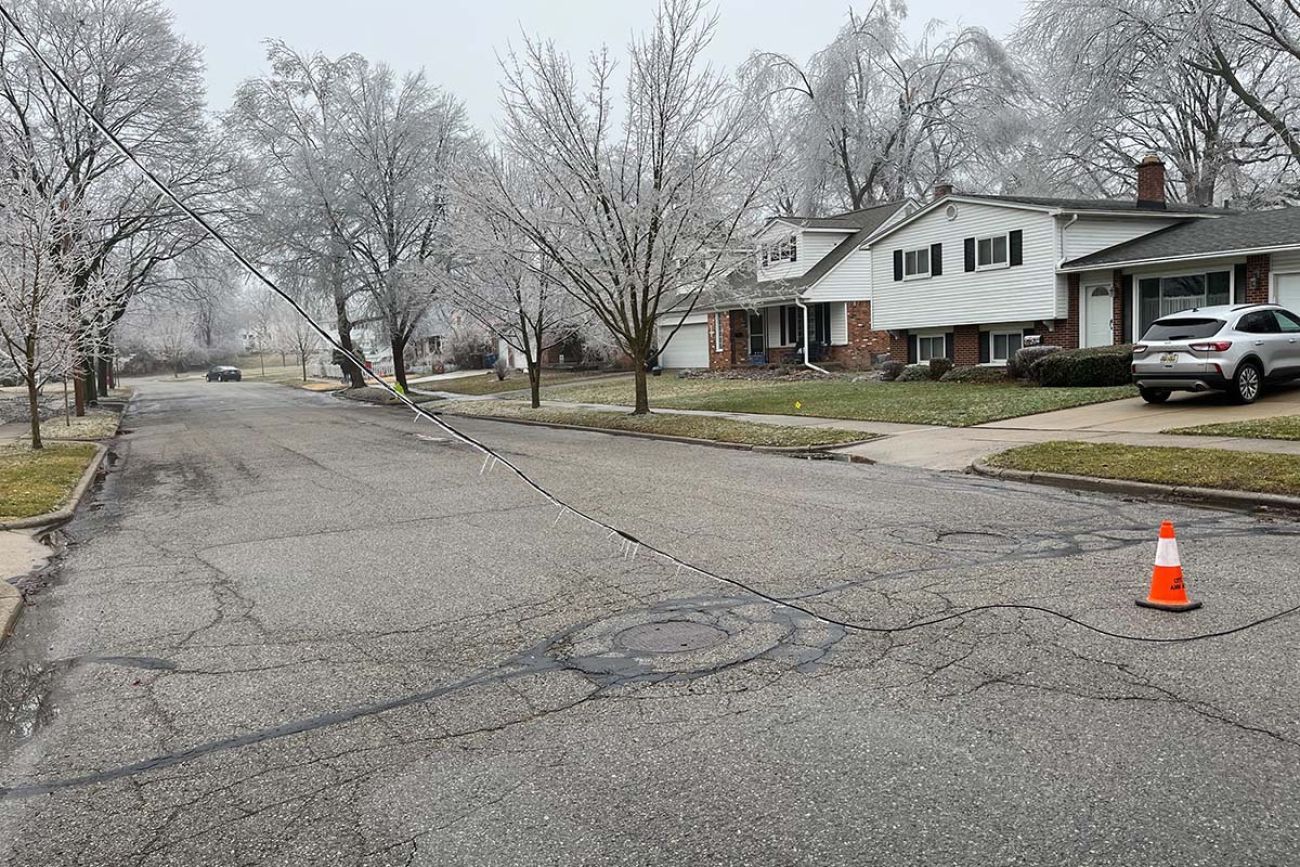Utilities gave big to Michigan lawmakers now weighing reforms, records show

- 102 of 148 sitting Michigan lawmakers have received campaign funds from utility company PACs
- A handful of Democratic lawmakers have called for investigations into recent power outages
- Some legislative leaders say campaign donations won’t affect their decision making
LANSING — Michigan lawmakers, under pressure to increase accountability of utilities following widespread power outages in recent weeks, have accepted more than $2 million in campaign donations from the political arms of the state’s two biggest utility companies in the past five years, a Bridge Michigan analysis has found.
In a situation that House Majority Floor Leader Abraham Aiyash, who is pushing reforms, calls a “major conflict of interest,” 102 of 148 currently serving legislators raised money from the political action committees of DTE Energy and Consumers Energy, campaign finance reports show.
That’s nearly 70 percent of all legislators. In all, the PACs donated more than $2 million to Democratic Gov. Gretchen Whitmer, lawmakers and legislative caucus funds from January 2017 to December 2022. DTE’s PAC gave $1.2 million, while Consumers’ PAC donated $855,000.
Related:
- Michigan Democrats pressure utilities: more credits for power outages
- Michigan has far more power outages this week than other Midwest states
- Michigan power outages: Thousands could remain without service for days
“We are responsible for setting the rules and the guidelines (for the utilities),” said House Majority Floor Leader Abraham Aiyash, D-Hamtramck, who told Bridge Michigan on Wednesday he would not accept corporate PAC money and did not raise any funds from either utility’s PACs.
To be sure, the level of giving isn’t new, as PACs and trade associations have heavily donated to lawmakers for decades.
In the first half of 2019, DTE Energy PAC ranked 10th in Michigan among PAC fundraising, according to an analysis by the Michigan Campaign Finance Network, and was among the five biggest donors to Democrats in the month following the November election last year.
But the giving is under scrutiny now that Democrats and Republicans alike have called for legislation to compensate customers who spent several days without electricity after outages.
In the past two weeks, two storms have knocked out power to more than 700,000 customers in Michigan, which ranks near the bottom in grid reliability and charges the highest utility rates among Midwestern states, according to data from the U.S. Energy Information Administration.
Some Democrats have called for an investigation into the situation and pledged to hold utilities accountable. Republicans have pushed for $200 million in grants to residents who lost power for more than 48 hours.
Customers used to receive a one-time $25 credit for extended power outages and had to request for the credit. But under new rules passed by the Michigan Public Commission — the main regulatory agency overseeing utilities — customers will automatically receive a $35 credit for long outages starting this month. They will also receive an additional $35 each day if their power is out beyond a certain number of days, spokesperson Matt Helms said Wednesday.
The commission has launched reviews of power outages, ordered a full-scale audit of the electric distribution systems” of the two utility companies and updated its rules and standards, Helms said Wednesday.
Aiyash is calling for legislation this year that would require utilities to pay hourly compensations to ratepayers experiencing power outages, increase the reimbursement rate as outages go on and disclose the scale of outages on electric bills.
Similar legislation Aiyash co-sponsored failed to pass last year.
Consumers Energy spokesperson Katie Carey told Bridge in an email last week the PAC funds “come from voluntary employee contributions to our PAC which is run and organized by employees.”
“We strive not to look at issues from a partisan lens but conduct our business in a transparent way to engage with public officials to build trusted relationships, because we are truly focused on helping our customers,” she said.
“In the past five years, we spent $3.26 billion to improve electric reliability, $4.5 billion to modernize our natural gas system and $45 million to support nonprofits.”
DTE Energy spokesperson Peter Ternes said in a Thursday email the employees-funded company PAC is bipartisan, voluntarily discloses its donations online and gives “in accordance with all applicable federal and state laws.”
He stressed the donations are “funded through shareholder dollars and employee contributions and are not a part of electric rates.”
“As an energy company, DTE is affected each day by the decisions of federal, state and local officials,” he said. “We owe it to our customers and employees to support candidates for public office that help us meet our purpose of providing safe, reliable, affordable and clean energy for the 3 million plus residents and businesses we serve every day.”
Utility companies in Michigan said power interruptions and outage time decreased last year in Michigan. But last month, state customers experienced far more outages than any of the other Midwestern states.
The Michigan League of Conservation Voters has called for investigations into utility companies over power outages for years.
“We reached a tipping point,” said Bob Allison, deputy director of the advocacy group. “This is unacceptable.”
Power brokers
The two utility giants have successfully warded off legislation that would have required them to pay more in hourly credits to customers due to lost power.
Whitmer, who took office in 2019, raised a total of $115,400 during the five-year period in direct contributions from both company PACs — more than any sitting lawmaker.
Among state lawmakers, the contributions went to both Republicans and Democrats but leaned toward the GOP, which controlled the Legislature during the five-year period.
Day 10 - 339k without power in Michigan! A catastrophic failure of leadership.
— Tudor Dixon (@TudorDixon) March 4, 2023
How is this not a national story? Where is Whitmer? Could she be enjoying reliable energy on spring break in a red state?
Now all her cronies will come running with, “she doesn’t work for DTE”. pic.twitter.com/ERj5YnqKTm
In all, 52 Republican lawmakers received a total of $460,925 from the two utility PACs while 50 Democrats raised $383,800 from the groups. Republican caucus funds in the legislative chambers raised $675,475 from both PACs while Democratic ones received just $404,500.
The utility companies themselves — different from the company PACs — reported spending a combined $55 million in political, civic and related expenses between 2017 and 2020, The Detroit News reported. The money went to a variety of causes, funding for nonprofits that bought ads for political candidates, The News reported.
“It’s the question that Michiganders have been asking now for years, which is: ’Does the Legislature regulate and oversee Consumers (Energy) and DTE? Or is it the other way around?” asked Allison of the Michigan League of Conservation Voters.
Of all sitting lawmakers, former House Energy Committee Chair Rep. Joe Bellino, R-Monroe, received the most direct contribution from the two company PACs, totaling $57,500 between 2017 and 2022, records show.
DTE Energy Company PAC also paid a total of $4,670 to Bellino’s campaign in golf tournament-associated fees between 2019 and 2021, records show.
Bellino did not respond to a call for comment. But in a 2021 interview with The Detroit News, Bellino said he was “going to hold their feet to the fire” and vigorously regulate utilities.
The leadership PAC and campaign account of Senate Minority Leader Aric Nesbitt, R-Porter Township, received $44,000 from the two utility PACs between 2017 and 2022.
His spokesperson, Jeff Wiggins, told Bridge the senator’s “record on this is clear.”
Nesbitt, who chaired the House Energy and Technology Committee in 2014, held hearings “into the procedures and responses of utility companies” following the December 2013 ice storm that left hundreds of thousands of Michiganders powerless during the holidays, Wiggins said.
But Nesbitt has also advocated for legislation benefiting the two utility firms. In 2015, Nesbitt introduced bills to end limited energy competition and allow DTE and Consumers Energy to monopolize the electric utility market, according to the News.
“The Legislature is inherently tasked in performing proper oversight of certain aspects of energy, organized labor, health care, trial lawyers, etc. for the well-being of the state,” Wiggins said Wednesday. “True public servants perform their duty regardless of political motivation and Sen. Nesbitt’s record reflects that.”
My office has been fielding calls all week from people without power. My colleagues and I will be demanding answers and accountability from the utilities https://t.co/o07Zv7T9B4
— Jason Hoskins (@JasonMHoskins) March 4, 2023
Accounts associated with House Speaker Joe Tate, D-Detroit, received a total of $19,250 from the two utility PACs between 2018 and 2022, records show.
“Campaign contributions do not impact Speaker Tate’s decision-making on legislation,” his spokesperson, Amber McCann, told Bridge.
She noted that Democrats will “look into the outages and response to those outages.”
Records show that Senate Majority Leader Winnie Brinks, D-Grand Rapids, and her leadership PAC received $27,750 during the five-year period while House Minority Leader Matt Hall, R-Richland Township, and his leadership PACs received $25,250.
Spokespeople for those lawmakers did not offer comments when reached by Bridge last week.
Calling for solutions
Aiyash, the Hamtramck Democrat, told Bridge he wants utility companies to reimburse all ratepayers who lost power for the true costs to them of the outage, including food and medicine that must be refrigerated. He said he wants customer bills to reflect the length, number and reasons for outages as well.
“It’s important that customers have an understanding of what is going on,” he said. “It’s not enough to simply say, ‘There’s a storm that happened, therefore, your power is out.’”
In a Wednesday night statement to Bridge, Whitmer spokesperson Bobby Leddy said the governor will review introduced legislation that “puts Michiganders first,” noting she proposed “an additional $43 million proposal focused on energy grid resiliency” in this year’s budget.
“Michiganders should be able to count on reliable and affordable power,” he said.
Senate Committee on Energy and Environment Chair Sean McCann, D-Kalamazoo, released a statement Tuesday urging lawmakers to “investigate the situation” and said he is “committed to holding hearings” to explore ways to improve the grid.
Sean McCann’s campaign and leadership PAC received $23,500 from the utility PACs between 2019 and 2022, records show. The senator did not return a Wednesday email from Bridge for comment.
Aiyash told Bridge he hopes legislators would “err on the side of people and listen to the call of their constituents.”
“I do believe that, given that they are a regulated industry by state lawmakers, they should not be funneling dollars — be it from their employees, their executives, or what have you — … to influence the decisions.”
Editor’s note: This story has been updated to correctly reflect a quote from Bob Allison, deputy director of Michigan League of Conservation Voters.
See what new members are saying about why they donated to Bridge Michigan:
- “In order for this information to be accurate and unbiased it must be underwritten by its readers, not by special interests.” - Larry S.
- “Not many other media sources report on the topics Bridge does.” - Susan B.
- “Your journalism is outstanding and rare these days.” - Mark S.
If you want to ensure the future of nonpartisan, nonprofit Michigan journalism, please become a member today. You, too, will be asked why you donated and maybe we'll feature your quote next time!




